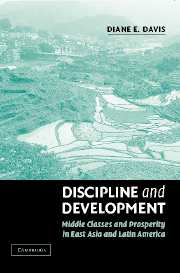Book contents
- Frontmatter
- Contents
- Preface
- DISCIPLINE AND DEVELOPMENT
- 1 An Introduction to Middle Classes, Discipline, and Development
- 2 Middle Classes and Development Theory
- 3 Discipline and Reward: Rural Middle Classes and the South Korean Development Miracle
- 4 Disciplinary Development as Rural Middle-Class Formation: Proletarianized Peasants and Farmer-Workers in Argentina and Taiwan
- 5 From Victors to Victims? Rural Middle Classes, Revolutionary Legacies, and the Unfulfilled Promise of Disciplinary Development in Mexico
- 6 Disciplinary Development in a New Millennium: The Global Context of Past Gains and Future Prospects
- Appendix A Cases, Comparisons, and a Note on Methodology and Sources
- Appendix B Defining the Middle Class: Notes on Boundaries and Epistemology
- Appendix C Tables
- Bibliography
- Index
4 - Disciplinary Development as Rural Middle-Class Formation: Proletarianized Peasants and Farmer-Workers in Argentina and Taiwan
Published online by Cambridge University Press: 31 July 2009
- Frontmatter
- Contents
- Preface
- DISCIPLINE AND DEVELOPMENT
- 1 An Introduction to Middle Classes, Discipline, and Development
- 2 Middle Classes and Development Theory
- 3 Discipline and Reward: Rural Middle Classes and the South Korean Development Miracle
- 4 Disciplinary Development as Rural Middle-Class Formation: Proletarianized Peasants and Farmer-Workers in Argentina and Taiwan
- 5 From Victors to Victims? Rural Middle Classes, Revolutionary Legacies, and the Unfulfilled Promise of Disciplinary Development in Mexico
- 6 Disciplinary Development in a New Millennium: The Global Context of Past Gains and Future Prospects
- Appendix A Cases, Comparisons, and a Note on Methodology and Sources
- Appendix B Defining the Middle Class: Notes on Boundaries and Epistemology
- Appendix C Tables
- Bibliography
- Index
Summary
Rural Middle Classes in Comparative Perspective
The disciplinary development model pursued by General Park in South Korea over the 1960s and 1970s based its promise on gains to be generated by a vibrant class of small-scale rural producers. For a while, this unfulfilled promise was sufficient to sustain the government's commitment to disciplining industrialists, who were then expected to generate foreign exchange earnings through manufacturing exports so that revenues could be recycled into self-sustaining and nationally generative rural development. But a thriving rural economy and a vibrant middle class of farmers with the productive capacity to generate robust forward and backward linkages between city and countryside never truly materialized in South Korea, at least not to the degree and in the form that Park imagined. Without a strong rural middle class of small agricultural producers stoking the fires of South Korea's economy, much of the glittering appeal of disciplinary development steadily lost its shimmer. The South Korean state still prioritized the export of manufactured goods after 1979, to be sure; and this brought foreign exchange gains and a contented class of industrial capitalists who continued to lead the country down the road of relatively successful export-led industrialization. But without rural economic gains, the countryside languished terribly. Farmers increasingly migrated to cities to work in factories, tipping the rural-urban balance and further limiting the national government's political capacity to discipline manufacturing industrialists and their urban-based laborers in a macroeconomically efficient fashion.
- Type
- Chapter
- Information
- Discipline and DevelopmentMiddle Classes and Prosperity in East Asia and Latin America, pp. 158 - 244Publisher: Cambridge University PressPrint publication year: 2004



